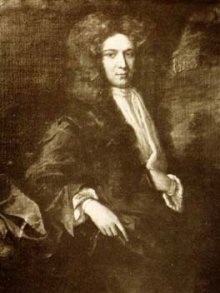Anthony Collins (philosopher) facts for kids
Quick facts for kids
Anthony Collins
|
|
|---|---|
 |
|
| Born | 21 June 1676 |
| Died | 13 December 1729 (aged 53) London, England
|
| Education | Eton College |
| Alma mater | King's College, Cambridge |
| Spouse(s) |
|
| Era | Modern philosophy |
| Region | Western philosophy |
|
Main interests
|
History, philosophy, theology |
Anthony Collins (born June 21, 1676 – died December 13, 1729) was an English philosopher and writer. He is known for being one of the first people to support Deism in Great Britain. Deism is a belief that God created the universe but does not interfere with it.
Contents
Anthony Collins's Life
Anthony Collins was born in Heston, England. His father, Henry Collins, was a lawyer. Anthony went to Eton College and King's College, Cambridge, which are famous schools. He also studied law.
A very important part of his life was his close friendship with another famous philosopher, John Locke. Locke spoke very highly of Collins in his letters. In 1715, Collins moved to Essex, where he worked as a justice of the peace. This meant he helped keep law and order. He passed away at his home in London.
Collins's writings brought together ideas from earlier English thinkers who believed in Freethought. He wrote in a very polite way, even when others disagreed strongly with him. He believed that "Ignorance is the foundation of atheism, and freethinking the cure of it." This means he thought that thinking freely helps people understand things better and avoid wrong ideas.
His Important Books
Essay concerning the Use of Reason
Collins's first important book was Essay concerning the Use of Reason (1707). In this book, he said that religious ideas should make sense to human reason. He believed that any new ideas about God should fit with what people naturally understand. He published this book without his name on it, but everyone soon knew he was the author.
A Discourse of Freethinking
Six years later, in 1713, Collins published his main work, A Discourse of Freethinking. This book talked about the importance of thinking freely. He argued that freethinking is a right that should not be limited. He believed it is the only way to find the truth. He also said that freethinking helps society and is even encouraged by the Bible.
This book caused a big stir in England. Many people saw it as supporting Deism, which was a new and sometimes controversial idea. Several writers, including Richard Bentley and Jonathan Swift, wrote replies to his book.
Discourse of the Grounds and Reasons of the Christian Religion
In 1724, Collins published another book called Discourse of the Grounds and Reasons of the Christian Religion. In this book, he looked at how prophecies from the Old Testament were supposedly fulfilled in the New Testament. He argued that these fulfillments were often symbolic, not literal. He also questioned how some parts of the Bible were chosen.
Many people wrote responses to this book. Some of the most well-known replies came from Bishop Edward Chandler and Samuel Clarke. Collins then wrote another book, Scheme of Literal Prophecy Considered (1727), to answer their arguments.
Ideas on Free Will
What is Necessitarianism?
In philosophy, Anthony Collins was a strong supporter of necessitarianism. This is the idea that everything that happens is already determined. It means that people's choices are not truly free, but are caused by things that happened before. His short book, Inquiry Concerning Human Liberty (1717), explains this idea very well.
Another philosopher named Samuel Clarke strongly disagreed with Collins. Clarke believed that having free will was very important for religion and morality. Collins did not reply to Clarke's arguments right away. But in 1729, he published his answer in a book called Liberty and Necessity.
Other Works and Interests
Collins wrote several other books. One was A Letter to Mr Dodwell. In this letter, he discussed ideas about the soul. He also wrote Vindication of the Divine Attributes (1710). In Priestcraft in Perfection (1709), he questioned how certain church rules were made.
Anthony Collins was known for being one of the most well-read people in England. He loved books and collected a huge number of them. His private library had almost 7,000 books! He especially liked books about history, religion, and philosophy.
Family Life
Anthony Collins was married twice. His first wife was Martha Child. They had two sons who died young, and two daughters named Elizabeth and Martha. His daughter Martha later married Robert Fairfax, 7th Lord Fairfax of Cameron.
His second wife was Elizabeth Wrottesley.
See Also
Images for kids
 | Delilah Pierce |
 | Gordon Parks |
 | Augusta Savage |
 | Charles Ethan Porter |


